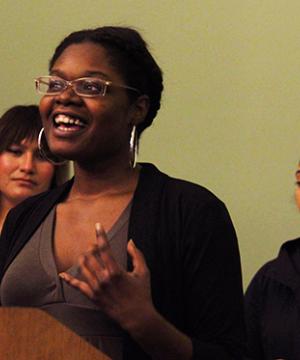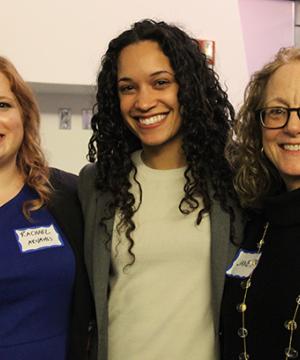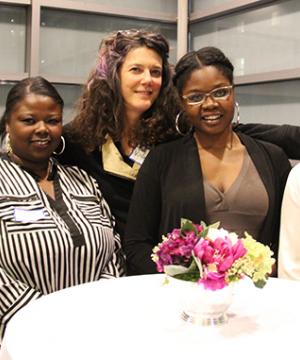Speaking Out for Foster Care Youth
The Adolescent Representation Clinic co-hosted the panel discussing the challenges facing young people as they age out of the foster care system at age 21.
| Natasha Santos (center) speaks about finding her home after aging out of foster care, with Vanessa Fuentes (left) and Awilda Ferreira (right). |
“I love telling people about where I live,” says 28-year old Natasha Santos, her face lighting up as she describes the cotton candy-pink house in Crown Heights, Brooklyn that she shares with several new friends.
It wasn’t always this way—Santos lived in six different foster homes growing up. After college, she looked for a true community where she could “share more than rent” with roommates, and feels fortunate to have found her current home. Santos, who now works at the New York City Department of Education and describes herself as an advocate and writer, wants to open her own housing collective one day, for foster children and disenfranchised young people.
Santos and three other former foster care youths shared their moving and deeply personal stories last week at a Columbia Law School event called “Aged Out/Cast Out: The Speak-Out.” The event was co-sponsored by the Adolescent Representation Clinic at the Law School/Morningside Heights Legal Services and the nonprofit Youth Communication, and brought together foster youths, agencies, housing providers, politicians, advocates, lawyers, and law students to share experiences and discuss the problem of housing instability among young people as they age out of the foster care system at age 21.
The Speak-Out was organized by Columbia Law School student Rachael Siegel ’17 as part of a series of advocacy efforts by the clinic to engage the community and implement recommendations made in a July 2016 report, “Aged Out/Cast Out.” Drawing from stories of the clinic’s clients, the report offers policy and legislative recommendations to address the issues many young people face when transitioning from the foster care system to living on their own. These include letting foster youth applying to the NYC Housing Authority (NYCHA) indicate they are flexible on housing site locations and allowing them to apply for apartments with their foster siblings; improving housing advice; increasing the Administration for Children’s Services (ACS) housing subsidy for aging out youth to enable them to afford housing, and giving priority for CUNY and SUNY dorm housing to aging-out foster youth.
| Professor Jane Spinak, founder of the Adolescent Representation Clinic (right); with event organizer Rachael Siegel '17 (left); and Loretta Johnson '16 (center), who worked on the clinic report. |
During an audience Q&A session, Professor Jane Spinak, the Edward Ross Aranow Clinical Professor of Law and founder of the Adolescent Representation Clinic, asked the young women to suggest changes to the current process.
“I’d ask the social workers not to hold our hand in every situation,” said Sharlene Tolbert, who struggles with her bipolar disorder as she looks for a job before returning to school. The case managers’ limited or misinformation and frequent turnover made the aging out process more difficult, she said. “Let us be independent. Because when we turn 21, no one is holding our hand.”
Their lawyers, on the other hand, were wonderful, according to all four speakers. One lawyer in particular was "like family,” Tolbert said, tearing up.
The women shared stories they wrote for Represent Magazine, published by Youth Communication, about the challenges they faced in securing housing as they aged out of the foster care system. Awilda Ferreira and her son had no place to live when she turned 21. Her last foster mother allowed her to remain in her home for several months until she secured a NYCHA apartment, one of the happiest moments in her life.
Vanessa Fuentes is a transgender woman who was undocumented from Mexico who experienced a period of homelessness after leaving foster care. While working as a paralegal, she lived secretly in her office on nights and weekends. She has now earned an A.A. and is pursuing a bachelor’s degree in political science.
“It took a while to be honest with myself and to realize why I got so upset when roommates moved out [of my current house]—because growing up when people left I never saw them again,” said Santos, who pointed out one of her old roommates in the audience, now a Columbia student. “I think it’s liberating to be able to say I’m an adult now, I’m autonomous.”
“When thinking about the future, set short term goals first and the long-term goals will come gradually,” Tolbert added.
| Pictured from left to right: Awilda Ferreira, Sharlene Tolbert, Represent Magazine editor Virginia Vitzthum, Natasha Santos, and Vanessa Fuentes. |
Melody JoAnne Centeno, a former foster care youth and founder of the advocacy group Foster Care Unplugged, spoke about her work and encouraged the others to “turn their pain into passion.” Then three members of You Gotta Believe, a group of foster care alumni that advocate for youth currently in the system rose from the audience to share their stories.
Represent Magazine brought copies of their “The Search for Home” issue to the event, which was issued concurrently with the release of the Aged Out/Cast Out report. “We make a great team,” Represent editor Virginia Vitzthum said about the magazine and the Adolescent Representation Clinic. “The Aged Out/Cast Out report responds to writers’ struggles with great policy ideas.”
Read More:
Aged Out/Cast Out: Foster Care Teens Face Housing Instability
Adolescent Representation Project/Clinic
Adolescent Representation Clinic's Report, Aged Out/Cast Out
###
Posted February 6, 2017


